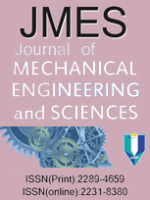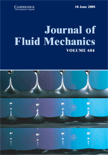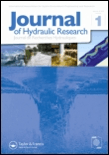
Flow
Scope & Guideline
Catalyzing innovation through open access research.
Introduction
Aims and Scopes
- Fluid Dynamics and Hydrodynamics:
The journal emphasizes research that explores the fundamental principles of fluid dynamics, including the behavior of fluids in various states, interactions with solid boundaries, and the resulting forces and flows. - Microfluidics and Nanofluidics:
A significant focus on micro and nanofluidic systems is evident, with studies investigating the manipulation of fluids at small scales, which has implications for biomedical applications, chemical analysis, and materials science. - Computational Fluid Dynamics (CFD):
The use of numerical simulations and advanced computational techniques to model fluid behavior in complex scenarios is a core area, enabling researchers to predict flow patterns and interactions in both natural and engineered systems. - Experimental Fluid Mechanics:
The journal publishes experimental studies that validate theoretical and computational models, providing crucial empirical data on fluid behavior under various conditions. - Interdisciplinary Applications:
Research often intersects with other disciplines, such as biological systems, environmental science, and engineering, showcasing the versatility of fluid dynamics in addressing real-world problems.
Trending and Emerging
- Biological Fluid Dynamics:
Research at the intersection of fluid dynamics and biology is on the rise, particularly studies exploring the mechanics of fluid flow in biological systems, such as blood flow in cardiovascular dynamics and the swimming patterns of aquatic organisms. - Turbulence and Complex Flows:
An increase in studies examining turbulent flows, including their implications for energy efficiency and environmental impacts, reflects a growing interest in understanding complex flow behaviors. - Environmental Fluid Mechanics:
There is a notable trend towards investigating fluid dynamics in environmental contexts, such as pollution dispersion, sediment transport, and the effects of turbulence on marine and atmospheric systems. - Micro and Nanotechnology Applications:
The exploration of fluid dynamics in microfluidic devices and nanotechnology is gaining attention, with applications in healthcare, chemical processing, and advanced materials. - Data-Driven and Machine Learning Approaches:
The integration of machine learning techniques in fluid dynamics research is emerging, enabling data-driven analyses and predictions that enhance the understanding of fluid behaviors and streamline experimental processes.
Declining or Waning
- Traditional Aerodynamics:
While aerodynamics remains a key area, there appears to be a decline in studies focusing solely on traditional aerodynamic principles, possibly due to a shift towards more complex interactions involving turbulence and fluid-structure interactions. - Largely Theoretical Studies:
Research that is predominantly theoretical without experimental or computational validation has decreased, indicating a growing preference for studies that incorporate practical applications or empirical data. - Simple Flow Models:
There is a noticeable reduction in the publication of papers utilizing overly simplified models of fluid behavior, as the community increasingly favors more sophisticated approaches that capture the complexities of real-world flows.
Similar Journals

Fluids
Advancing fluid dynamics through open access research.Fluids is a leading open-access journal published by MDPI that commenced its publication in 2016, fostering a vibrant platform for the dissemination of high-quality research in the fields of Condensed Matter Physics, Fluid Flow and Transfer Processes, and Mechanical Engineering. Based in Switzerland, the journal has earned a prominent reputation, achieving a Q2 categorization in the latest 2023 rankings, indicating its significant impact within respective subject areas. Researchers and professionals will find Fluids an invaluable resource, as it not only facilitates the sharing of innovative studies but also provides open access to research findings, ensuring widespread visibility and utility. With a diversified editorial board and a commitment to exploration in fluid dynamics and related applications, Fluids aims to advance knowledge, foster collaboration, and inspire future research endeavors among its readership. As the journal converges into new frontiers from 2016 to 2024, it continues to be a pivotal reference for scholars and practitioners alike.

Experimental and Computational Multiphase Flow
Exploring the Dynamics of Multiphase FlowExperimental and Computational Multiphase Flow, published by SpringerNature, is a prestigious academic journal that critically examines advancements in the field of fluid dynamics, with a specialized focus on multiphase flow phenomena. Since its inception in 2019, the journal has established a remarkable reputation, attaining Q1 status in Fluid Flow and Transfer Processes as well as Mechanical Engineering according to the 2023 category quartiles, reflecting its high impact and relevance in these domains. With Scopus rankings placing it among the top 15 journals in both Chemical Engineering and Nuclear Energy and Engineering, Experimental and Computational Multiphase Flow is an essential resource for researchers, professionals, and students engaged in cutting-edge studies and applications. Although it operates on a subscription model, the journal remains dedicated to disseminating high-quality research and fostering a deeper understanding of complex fluid interactions across various scientific disciplines. By prioritizing innovative methodologies and interdisciplinary collaborations, the journal aims to significantly contribute to the ongoing evolution of multiphase flow research, recognizing its critical importance in engineering and energy sectors.

Propulsion and Power Research
Exploring the Dynamics of Energy Solutions.Propulsion and Power Research, published by KEAI PUBLISHING LTD, is a leading Open Access journal that has been advancing the field of propulsion and power systems since its inception in 2012. With its commitment to fostering scientific discourse and innovation, the journal has gained a prominent position within academia, achieving a Q1 ranking in multiple categories such as Aerospace Engineering, Automotive Engineering, and Fluid Flow and Transfer Processes as of 2023. With an impressive ranking of #18 out of 153 in Aerospace Engineering and consistent recognition in the Scopus rankings, the journal explores critical advancements and research findings that propel the industry forward. As an Open Access publication, it ensures that groundbreaking research is readily available to a broad audience, enhancing collaboration between researchers, practitioners, and students. The journal's scope encompasses a wide range of topics within propulsion and energy solutions, making it an essential resource for anyone keen on discovering significant developments in this dynamic field.

Journal of Mechanical Engineering and Sciences
Bridging Theory and Application in Engineering ExcellenceThe Journal of Mechanical Engineering and Sciences (ISSN: 2289-4659, E-ISSN: 2231-8380), published by UNIV MALAYSIA PAHANG, is a prominent open access journal established in 2011, dedicated to advancing the field of mechanical engineering and associated sciences. Covering a wide array of topics from industrial manufacturing processes to computational mechanics, the journal serves as a vital platform for researchers, professionals, and students to disseminate innovative findings and methodologies. With impressive Scopus rankings, including a place in the 60th percentile for Industrial and Manufacturing Engineering, the journal holds a significant position among its peers, facilitating global academic discourse. Located in Kuantan, Pahang, Malaysia, the journal emphasizes accessibility and collaboration within the engineering community, encouraging submissions that contribute to both theoretical and applied aspects of mechanical engineering.

Journal of Mathematical Fluid Mechanics
Illuminating the Path of Fluid Dynamics with Mathematical RigorThe Journal of Mathematical Fluid Mechanics, published by SPRINGER BASEL AG, is a prestigious academic journal dedicated to the study of fluid dynamics through the lens of mathematics. With its ISSN 1422-6928 and E-ISSN 1422-6952, this journal has firmly established itself in the academic community since its inception in 2004, converging knowledge across various mathematical disciplines until 2024. Recognized in the top Q1 quartile rankings for Applied Mathematics, Computational Mathematics, Condensed Matter Physics, and Mathematical Physics as of 2023, it reflects a strong commitment to high-quality research and innovation. The journal features a variety of research articles, reviews, and theoretical frameworks, serving as an essential resource for researchers, professionals, and students eager to explore the mathematical principles underlying fluid mechanics. While it does not offer open access, the impact of its contributions resonates within interdisciplinary fields, advancing both theoretical insights and practical applications.

JOURNAL OF FLUID MECHANICS
Unraveling the complexities of fluid behavior.JOURNAL OF FLUID MECHANICS, published by Cambridge University Press, is a premier international journal recognized for its significant contributions to the field of fluid dynamics. With an esteemed impact factor that places it in the Q1 category across multiple disciplines, including Applied Mathematics, Condensed Matter Physics, Mechanical Engineering, and Mechanics of Materials, this journal serves as a vital resource for researchers and practitioners alike. Established in 1956, it provides a platform for innovative and high-quality research articles that advance the understanding of fluid mechanics phenomena. The journal's rankings underscore its prestige, with Scopus recognizing it among the top journals in its category. Although it currently does not offer open access, the journal remains accessible to educational institutions and professionals in the United Kingdom and beyond. By addressing critical and emerging topics in fluid mechanics, JOURNAL OF FLUID MECHANICS is essential for those striving to push the boundaries of knowledge and application in this dynamic field.

International Journal of Fluid Mechanics Research
Advancing Knowledge in Mechanical Engineering and PhysicsThe International Journal of Fluid Mechanics Research, published by BEGELL HOUSE INC, is a pivotal platform for the dissemination of innovative research within the fields of Mechanical Engineering and Physics. With a focus on the intricate dynamics of fluid behavior, this journal has been a cornerstone of scholarly communication since its inception in 1996, continuing to engage a global audience of researchers and professionals through to 2024. With a respectable Impact Factor reflecting its significant contributions to the disciplines—ranking in Q3 for both Mechanical Engineering and Miscellaneous Physics and Astronomy categories—this journal presents a unique opportunity for authors to share their findings in a peer-reviewed environment. Although it does not currently offer Open Access options, all published articles are carefully curated, ensuring high-quality research is accessible to its readership. As the journal navigates the complexities of fluid mechanics, it fosters an interdisciplinary dialogue, bridging theoretical frameworks with practical applications, thereby enhancing understanding and innovation in related fields.

EXPERIMENTAL THERMAL AND FLUID SCIENCE
Exploring the dynamics of heat and fluid with cutting-edge studies.EXPERIMENTAL THERMAL AND FLUID SCIENCE is a prestigious academic journal published by Elsevier Science Inc, dedicated to advancing the fields of thermal and fluid sciences. With a strong focus on innovative experimental research, it plays a crucial role in disseminating new knowledge and techniques across multiple domains, including Aerospace Engineering, Chemical Engineering, Fluid Flow and Transfer Processes, Mechanical Engineering, and Nuclear Engineering. Holding a notable impact factor and ranking in the Q1 quartile across these categories since 2023, the journal is recognized for its high-quality contributions, which appeal to a diverse audience of researchers, industry professionals, and students alike. Additionally, with dedicated coverage from its inception in 1988 to projections extending through 2025, EXPERIMENTAL THERMAL AND FLUID SCIENCE provides a vital platform for sharing advancements in experimental techniques and findings that shape the future of engineering and applied sciences.

JOURNAL OF HYDRAULIC RESEARCH
Transforming Water Science with Groundbreaking ResearchJOURNAL OF HYDRAULIC RESEARCH, published by TAYLOR & FRANCIS LTD, serves as a leading platform for the dissemination of groundbreaking research in the fields of civil and structural engineering as well as water science and technology. With its inception in 1963 and a focus that spans to 2024, the journal holds a notable reputation, categorized in the Q2 quartile in both engineering and environmental sciences, indicating its significant impact on contemporary research. It is indexed under ISSN 0022-1686 and E-ISSN 1814-2079, allowing for a comprehensive reach to professionals and scholars worldwide. The journal regularly features high-quality articles, fostering an academic community dedicated to innovative hydraulic research, sustainable water management, and engineering advancements. Researchers and practitioners benefit from the rigorous peer-review process that ensures the highest standards of scholarly excellence in every published work. As part of its commitment to knowledge dissemination, JOURNAL OF HYDRAULIC RESEARCH remains an essential resource for anyone engaged in the dynamic interplay of water and engineering sciences.

Case Studies in Thermal Engineering
Elevating Knowledge in Thermal Engineering ExcellenceCase Studies in Thermal Engineering, published by ELSEVIER, stands as a premier platform for innovative research and analysis in the field of thermal engineering since its inception in 2013. With a robust Open Access model, this journal ensures that groundbreaking findings in fluid flow and transfer processes are readily accessible to a global audience, fostering collaboration and knowledge sharing across disciplines. Situated in the United Kingdom, the journal boasts an impressive impact factor, reflecting its status in the first quartile (Q1) for both engineering (miscellaneous) and fluid flow and transfer processes, as noted in the latest Scopus rankings. Researchers and professionals alike recognize its significance, ranking 9th out of 96 in Chemical Engineering and achieving a notable 91st percentile in its category. By publishing high-quality case studies, the journal aims to advance understanding and applications of thermal engineering principles, making it an essential resource for those looking to stay at the forefront of this dynamic field.